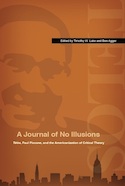A Journal of No Illusions: Telos, Paul Piccone, and the Americanization of Critical Theory is now available from Telos Press. Maxwell Woods talked with contributor Scott McNall about the influence of Telos and Paul Piccone on his intellectual outlook.
Maxwell Woods: Your article “The Good, the Bad and the Ugly: A Retrospective on Telos” discussed Telos‘s development, from its beginnings in 1968 to its publicizing of Carl Schmitt, federalism, and populism. How did this article, and Telos more generally, fit into your intellectual world when you wrote the piece?
 Scott McNall: When I wrote the piece, I was focused on the collapse of the economy, climate change, and the continued destruction of the biosphere on which human life depends. I wondered what it would be like if the Telos “gang” were all together again, what they would make of our current situation. I’m sure it would be more than just “We told you so.” I very much wished I could have found out from Paul Piccone what he thought about our current economic and biological crises, not because I would necessarily have agreed with him, but because I would have almost certainly been forced to deal with new ways of thinking about the problems. In writing the piece I also needed to go back over years of the journal; it was a treat and an opportunity to remember the debates, the good ideas, those that were not so useful, and the emotion and intellectual energy that fueled the entire Telos project.
Scott McNall: When I wrote the piece, I was focused on the collapse of the economy, climate change, and the continued destruction of the biosphere on which human life depends. I wondered what it would be like if the Telos “gang” were all together again, what they would make of our current situation. I’m sure it would be more than just “We told you so.” I very much wished I could have found out from Paul Piccone what he thought about our current economic and biological crises, not because I would necessarily have agreed with him, but because I would have almost certainly been forced to deal with new ways of thinking about the problems. In writing the piece I also needed to go back over years of the journal; it was a treat and an opportunity to remember the debates, the good ideas, those that were not so useful, and the emotion and intellectual energy that fueled the entire Telos project.
Woods: In your article you say, “Telos was a place to turn to try to understand the Vietnam War, the rise of crass commercialism, the inability of a left-learning intellectual class to have any seeming impact on the larger political and economic landscape, the growing power of transnational corporations, and laws that gave tax breaks to the wealthy and eroded the freedom of working men and women.” How, then, did Telos affect your personal intellectual development as you were searching for solutions to these problems? Did you have any relationships with personalities at Telos? How did these affect your own intellectual outlook?
McNall: Like everyone who was engaged with Telos, I have a Paul Piccone story, but it is relevant to the question posed. Mine involves trying to figure out Paul’s intellectual leaps of faith and his introduction of theories, theorists, and ideas I had never heard of before or thought were relevant. I was also challenged by Paul’s absolute passion for his ideas about what was “crap,” what was not, and the pursuit of topics that caused turmoil among those both writing for and helping to edit the journal. Just being part of the Teloscrowd broadened my understanding of social theory and the different ways in which we could understand the continued transformation of a capitalist world system. Central to this enterprise was the search for points of resistance and opposition to the over-rationalization of contemporary society. This intellectual back-and-forth forced me to focus not on what was wrong, because plenty of people were writing about that and continue to do so, but to focus on what might actually make a difference in terms of transforming the world in which we live. Being part of the Telos crowd was not unlike what it must have been to be one of Ken Kesey’s Merry Pranksters traveling on their psychedelic painted bus. As the Merry Pranksters said, you were either “on the bus” or you were “off the bus.” Whether you were on or off the bus, the fact was that Telos was a fast moving one that you had to run to catch up with. You did not want to be left behind.



